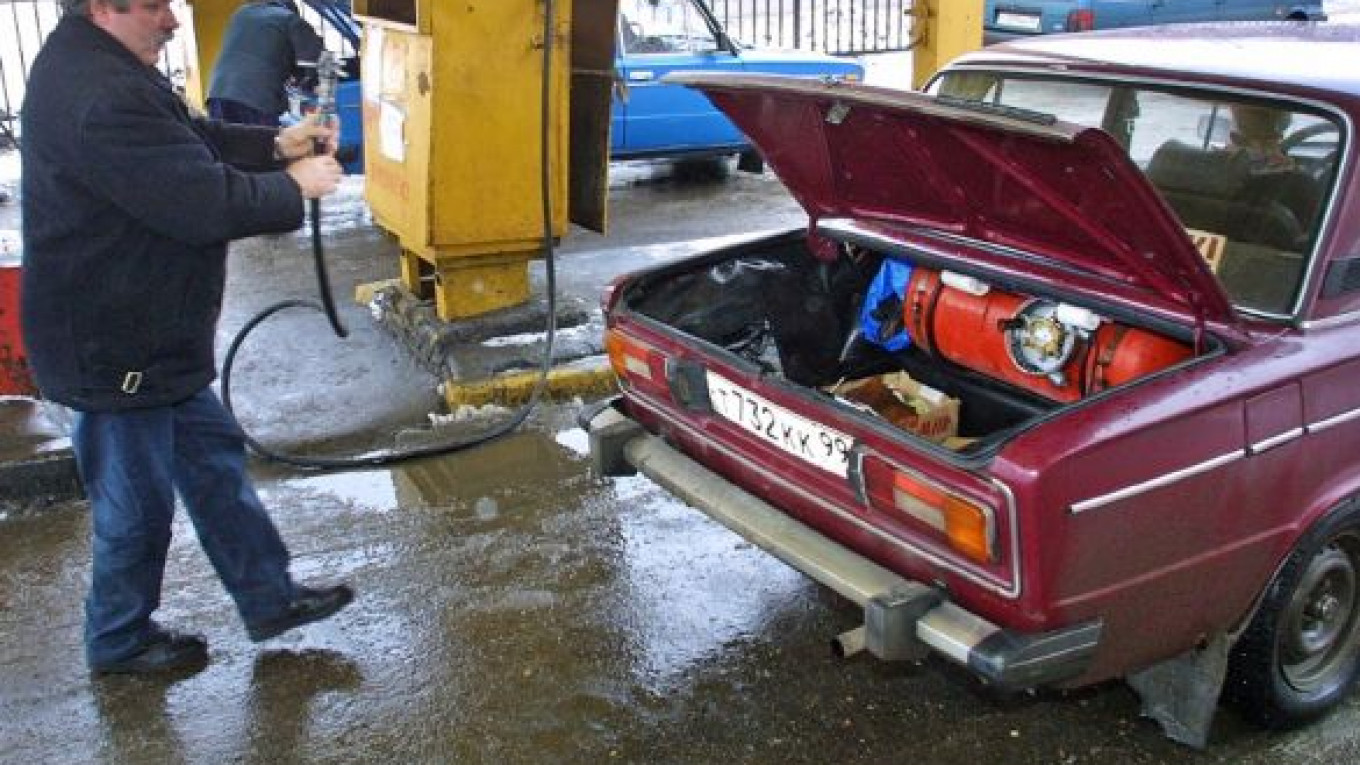President Vladimir Putin threw his weight behind a drive to fuel more Russian vehicles with cleaner-burning and cheaper natural gas on Tuesday, saying the economic and environmental benefits were clear.
A transition to using gas as a transportation fuel would reduce emissions in Russia — the world’s fourth biggest emitter of greenhouse gases — by two to three times, Putin said.
That would also boost the fortunes of state energy giant Gazprom whose net profit fell 10 percent in 2012 due to weak gas prices and flagging demand from austerity-ravaged Europe.
“Gas is cheaper than gasoline or diesel fuel, besides it reduces emissions,” Putin said at a meeting.
“Twenty percent of [global] natural gas is concentrated in Russia and this is a clear competitive advantage,” he added.
Prime Minister Dmitry Medvedev has also called for more gas-fuelled transport, saying Russia cannot not afford to ignore the global trend.
According to a resolution Medvedev signed on Monday, more than 50 percent of buses in major Russian cities will be switched to run on natural gas.
China last year had 1.48 million vehicles driving on natural gas, up 48 percent from 2011 thanks to a government initiative to encourage use of the cheaper alternative to gasoline and diesel.
Energy Minister Alexander Novak said there remained challenges to wide-spread, gas-powered transport in Russia including no regulatory framework and a lack of refueling infrastructure, with only 200 stations across the country.
The Russian government spent 3.5 billion rubles ($112 million) on gas-powered buses in 2012, he said.
Gazprom plans to invest 1 billion rubles ($31.92 million) and build 17 gas stations in 2013 to service new vehicles, while Russia’s top oil producer Rosneft plans to allocate 60 billion rubles to build 1,000 stations, according to Novak.
Rosneft chief Igor Sechin said Wednesday that the company would equip all of its filling stations in Sochi with natural gas fueling pumps, according to Interfax.
Meanwhile, Rosneft and Volkswagen Group on Wednesday signed a deal to develop compressed natural gas infrastructure, equip Rosneft filling stations with CNG facilities and promote the sales of CNG-powered vehicles produced by Volkswagen Group, Interfax reported.
“In the whole world today there are 17 million cars using gas fuel, while in Russia there are 103,000 vehicles,” Novak said. “The gas-powered transportation boom is only just beginning.”
Deputy Prime Minister Arkady Dvorkovich said earlier that the Cabinet had approved a resolution under which at least half of Russia’s public transport would be natural gas-powered, ITAR-TASS reported Monday.
However, Russia’s shift to using the cleaner fuel has not been without hiccups.
Last Thursday, as Russian’s celebrated Victory Day to mark the end of World War II, an empty gas-powered bus blew up in northwest Moscow after one of its cylinders exploded, state news agency RIA Novosti reported.
Russia recently lost its position as the world’s top gas producer, falling behind the United States because of its shale gas production boom.
Material from the Moscow Times was included in this report.
A Message from The Moscow Times:
Dear readers,
We are facing unprecedented challenges. Russia's Prosecutor General's Office has designated The Moscow Times as an "undesirable" organization, criminalizing our work and putting our staff at risk of prosecution. This follows our earlier unjust labeling as a "foreign agent."
These actions are direct attempts to silence independent journalism in Russia. The authorities claim our work "discredits the decisions of the Russian leadership." We see things differently: we strive to provide accurate, unbiased reporting on Russia.
We, the journalists of The Moscow Times, refuse to be silenced. But to continue our work, we need your help.
Your support, no matter how small, makes a world of difference. If you can, please support us monthly starting from just $2. It's quick to set up, and every contribution makes a significant impact.
By supporting The Moscow Times, you're defending open, independent journalism in the face of repression. Thank you for standing with us.
Remind me later.






